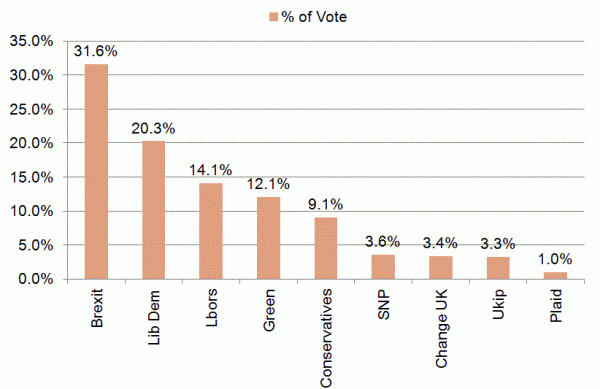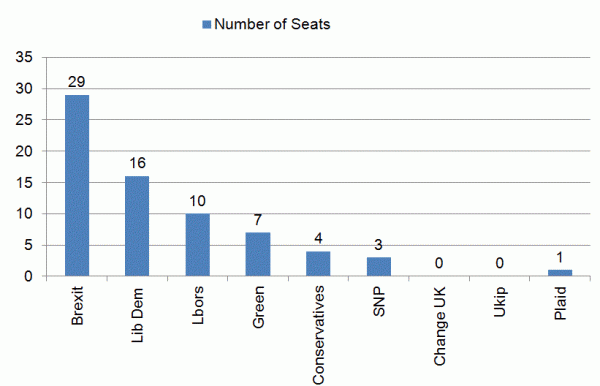The Brexit Party led by Nigel Farage emerges as the biggest party in the European Parliament, with 29 seats and 31.6% (up +31.6% from previously) of the votes across the 12 regions in the UK. Surge in votes was also seen in Liberal Democrats, a pro-EU party, and Greens, proponent of a second-referendum. Lib Dems secured 20.3% of the votes, up +13.4% while Greens got +12.1%, up +4.2%. The two larger parties, Labours and Conservatives, were penalized by voters due to their mishandling and ambiguous stance on the Brexit issue. With only 9.1% of the votes, Conservatives were granted only 4 seats. This marks a massive decline from 15 seats previously. Labors got 14.1% votes and 10 seats, marking a decline in votes by -11.3% and decline in the number of seats by -10. Rising supports for Brexit party, Lib Dems and Greens revealed deep division on Brexit among Britons. The decline of Conservatives and Labors marks the contempt for compromise and those trying please both sides.
Brexit Party Takes Most Votes and Seats in UK at the European Parliament Election
Despite success of the Brexit Party in the European Parliament election, composition of UK parliament remains unchanged. The MPs rejected the possibility of a no deal Brexit back in March. Yet, with strong support the Brexit Party in the European Parliament election might lead the next Conservative leader, and UK PM, to adopt a tougher stance on Brexit. While it is still no our base scenario, the possibility a no-deal Brexit on October 30 has inevitability increased.
Theresa May’s Legacy
UK’s PM Theresa May’s resignation on June 7 would be followed by the official leadership race on June 10 with nominations closed in a week’s time. About 10 Tory members have announced their intention to run for leadership, although polls suggest that Boris Johnson is in favor so far. After a selection by the 313 Tories MPs, the shortlisted candidates will be subject to a vote by about 100,000 rank-and-file members in the party. All in all, a new PM is expected to be in place by mid-July.
Chance of no-deal Brexit Increased, but Further Extension is More Likely
Encouraged by the result of the European Parliament election, the new PM is expected to adopt a tougher position on Brexit. He/she would still try to negotiate with the EU on some controversial issues, such as Irish border backstop, on the Withdrawal Agreement. The EU has already closed the door for further negation, the new PM might opt to leave the EU even without a deal on October 31. As such, the odds of no-deal Brexit have been increased. Yet, it is still not our base scenario. As mentioned about, the majority of the MPs (including the Conservatives) in the parliament rejects a no-deal Brexit. Heightened conflict between the government (with the new PM pushing to leave the EU no matter) and the MPs could leading to some Conservative MPs to trigger a vote of confidence in the new PM, resulting in an early election. For an early election to take place, the UK might need to apply further extension of Brexit into 2020.


